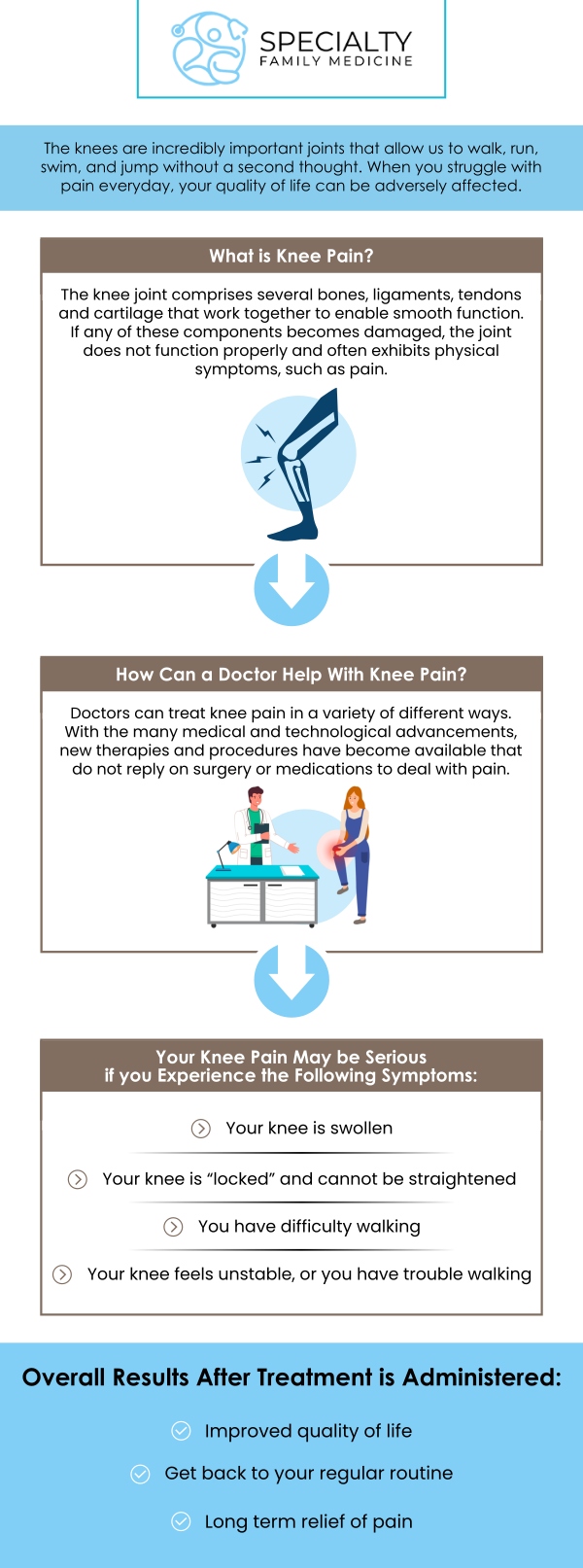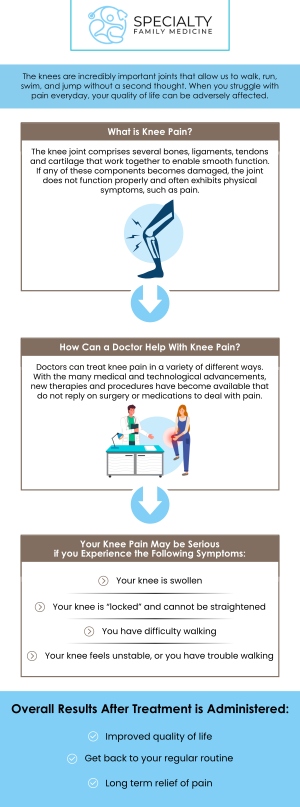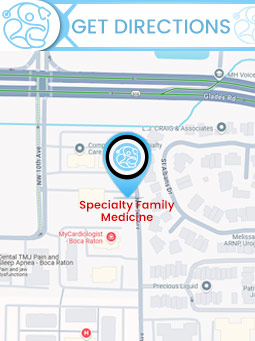Knee Pain Treatment in Boca Raton, FL
Knee pain can be caused by a variety of factors, including muscle strain, ligament injuries, or degenerative conditions like osteoarthritis. It can range from mild discomfort to severe pain that limits daily activities. At Specialty Family Medicine, Board-Certified Dr. Ayokunle Fatade offers personalized treatment to relieve knee pain and improve mobility, helping you regain function and quality of life. For more information, contact us today or schedule an appointment online. We are conveniently located at 1599 NW 9th Ave, Suite 4, Boca Raton, FL 33486.


Table of Contents:
What is knee pain?
What causes knee pain?
What are the common symptoms of knee pain?
When should I see a doctor for knee pain?
Can knee pain be a sign of arthritis?
How Does Dr. Ayokunle Fatade Approach Knee Pain Treatment at Specialty Family Medicine in Boca Raton, FL?
Knee pain refers to any discomfort or pain in or around the knee joint. The knee is a complex joint that supports much of the body’s weight, allowing for mobility and flexibility. When injured, inflamed, or affected by conditions like arthritis, it can result in pain and discomfort. Knee pain may vary from a mild ache to severe, sharp pain and can be constant or intermittent. It can occur in various parts of the knee, including the front, back, or sides of the joint, and may also radiate down the leg or up into the thigh. Knee pain is common in both active individuals and older adults, and it can be caused by trauma, overuse, or underlying conditions. Activities that involve frequent bending, jumping, or sudden twisting motions can put strain on the knee, leading to injuries or pain. Treatment for knee pain depends on the underlying cause, but it typically involves rest, physical therapy, anti-inflammatory medications, or, in some cases, invasive intervention. Proper management can often help alleviate symptoms and improve joint function.
Knee pain can stem from a variety of causes, ranging from injuries to medical conditions. Common causes include:
• Injury or Trauma: Injuries such as ligament tears (e.g., ACL tears), fractures, or cartilage damage (e.g., meniscus tears) are frequent causes of knee pain.
• Osteoarthritis: The wear and tear of cartilage in the knee joint due to aging can lead to osteoarthritis, causing pain, swelling, and stiffness.
• Bursitis: Inflammation of the bursa (a fluid-filled sac that cushions the knee joint) can lead to knee pain and swelling.
• Tendinitis: Overuse or strain on the tendons around the knee joint can cause tendinitis, often resulting in pain during movement or exercise.
• Patellar Problems: Conditions such as patellar tendinopathy, patellar dislocation, or patellofemoral pain syndrome (runner’s knee) can cause knee pain, especially in athletes or active individuals.
• Gout: A buildup of uric acid in the knee joint can cause sudden, severe pain, swelling, and redness.
• Infections: Bacterial infections in the knee joint can cause redness, swelling, fever, and severe pain, which requires immediate medical attention.
The cause of knee pain often determines the type of treatment needed, ranging from conservative methods like physical therapy to more advanced solutions.
Knee pain can manifest with a range of symptoms that vary in intensity, location, and frequency depending on the underlying cause. Common symptoms include:
• Pain: This can range from a dull ache to sharp, stabbing sensations and may be present at rest or triggered by certain movements or activities.
• Swelling: The knee may appear swollen or puffy, often due to inflammation, fluid buildup, or injury.
• Stiffness: Limited range of motion, making it difficult to bend or straighten the knee fully, is common with conditions like arthritis or after an injury.
• Instability: A feeling that the knee is giving way or that it is weak during movement can occur if ligaments or muscles are damaged.
• Tenderness: The knee may be sensitive to the touch, particularly in areas where there is inflammation, like the joint line or around the patella.
• Redness and Warmth: Inflammation in the knee joint can cause redness and warmth, especially when the knee is affected by conditions like bursitis or gout.
• Popping or Cracking Sounds: Some individuals experience popping, cracking, or grinding noises when moving the knee, which can be associated with cartilage issues or osteoarthritis.
The severity and type of symptoms often depend on the condition causing the pain and may vary from mild discomfort to debilitating pain.
You should see a doctor for knee pain if:
• The Pain Is Severe or Persistent: If your knee pain does not improve with rest, ice, or over-the-counter pain relievers, or if it worsens over time, professional evaluation is needed.
• You Experience Swelling or Redness: Significant swelling or visible redness in the knee joint may indicate inflammation or infection, which requires medical attention.
• You Can’t Move or Bear Weight: If the pain prevents you from fully moving your knee, or if you have difficulty standing or walking, this could indicate a serious injury or condition that needs immediate care.
• You Hear Popping or Grinding Sounds: Sudden popping, cracking, or grinding noises, especially accompanied by pain, can indicate ligament or cartilage damage, which requires professional assessment.
• There’s Numbness or Tingling: If knee pain is accompanied by numbness, tingling, or weakness in the leg, this may suggest nerve damage or compression.
• Signs of Infection: If the knee is warm, red, swollen, and painful, and accompanied by fever, an infection could be present, requiring immediate medical intervention.
Seeing a doctor early can help diagnose the cause of the pain and begin an appropriate treatment plan to prevent further damage and improve function.
Knee pain can be a common sign of arthritis, particularly osteoarthritis, which is the most common type affecting the knee joint. In osteoarthritis, the cartilage that cushions the bones in the knee wears down over time, leading to pain, stiffness, swelling, and difficulty moving the joint. This type of arthritis typically occurs as a result of aging, but it can also be triggered by previous injuries, overuse, or genetic factors.
Rheumatoid arthritis, an autoimmune condition, can also cause knee pain. In rheumatoid arthritis, the body’s immune system mistakenly attacks the synovial membrane that lines the joints, leading to inflammation and pain. Inflammatory arthritis, like gout or psoriatic arthritis, can also affect the knee, causing pain and swelling, often accompanied by redness and warmth.
Knee pain caused by arthritis may be chronic and gradually worsen over time, especially if left untreated. If knee pain persists, is accompanied by swelling or stiffness, or interferes with daily activities, it’s essential to see a healthcare provider for proper diagnosis and treatment options.
Dr. Ayokunle Fatade, board-certified at Specialty Family Medicine in Boca Raton, FL, offers a personalized and comprehensive approach to knee pain management. By thoroughly assessing each patient’s condition, he works to identify the underlying causes of discomfort, such as osteoarthritis, ligament injuries, or tendinitis. With his osteopathic background, Dr. Fatade develops tailored treatment plans that consider the patient’s physical, emotional, and lifestyle factors, ensuring a holistic approach to pain relief.
Treatment options provided by may include anti-inflammatory medications to help reduce pain and swelling, improving overall comfort and mobility. He emphasizes the importance of long-term relief by addressing the root causes of knee pain and promoting a healthy, active lifestyle. Our goal is to restore function and improve the quality of life for each patient through compassionate, individualized care, helping them regain the freedom to move without discomfort.
For more information, contact us today or schedule an appointment online. We are conveniently located at 1599 NW 9th Ave, Suite 4, Boca Raton, FL 33486. We serve patients from Boca Raton FL, Highland Beach FL, Lighthouse Point FL, Kings Point FL, Delray Beach FL, Deerfield Beach FL, Boynton Beach FL, and surrounding areas.

Additional Services You May Need

Additional Services You May Need
▸ Back Pain
▸ Neck Pain
▸ Neuropathy
▸ Arthritis
▸ Sciatica
▸ Chronic Pain
▸ Motor vehicle accident
▸ Crohn’s Disease
▸ Parkinsons
▸ Post Surgical Pain
▸ Headaches
▸ Migraines
▸ Achilles Pain
▸ Foot Pain
▸ Plantar Fasciitis
▸ Elbow Pain
▸ Tennis Elbow
▸ Joint Pain
▸ Shoulder Pain
▸ Irritable Bowel Syndrome
▸ Overweight/Obesity
▸ Chest Pain Syndrome
▸ Osteoporosis
▸ Endometriosis
▸ Menstrual Pain
▸ Rheumatoid Arthritis






